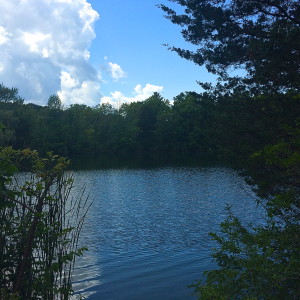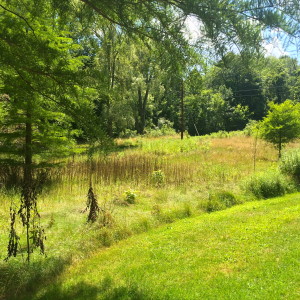Document 7
Author: Frank Byrd Carpenter,
Recipient: Adelia Antoinette Field Johnston
Date: 24 August 1909
Location: Adelia A. Field Johnston Papers, Series II. Correspondence
Document Type: Typed Letter, Signed by Author
Introduction:

Frank B. Carpenter was born on 17 July 1866 in Oberlin, Ohio. He attended both the Oberlin Preparatory School and Oberlin College, graduating from the latter in 1888. After his graduation, he took a course in Law at Columbia University and was admitted to the bar. He became a highly successful lawyer in Cleveland, Ohio, working primarily with railroad companies. He married fellow Oberlin student Edna Woods in 1890, and they had three children together. Carpenter died after a long illness on 29 November 1929. Though Carpenter lived in Cleveland, members of his family, including his sister, lived in Oberlin and he owned land there. While the location of the land is not clear, we know that “He owned the blocks on West College street occupied by the Tobin Drug store, the A. & P. store, the J. V. Hill, J. R. Haylor, Wright’s Variety, and the Herrick Jewelry store” and may have owned more real estate not listed here.1
Wherever his land was, some of it was along the proposed route for Johnston’s Community Parkway project, and it is clear that Johnston found it important enough to personally ask that this land be donated to the town of Oberlin and OVIS. It is equally clear that, though Carpenter professes respect for Johnston’s plans, he has little intention of giving up the land. Pay particular attention to the ways in which he calls into question both the validity and viability of Johnston’s project, specifically where he states that he does not see that the donation of the land would bring about “any great benefit.” Also worth noting is the fact that Carpenter consistently misspells Johnston’s name. Given that he was a student during her time at Oberlin, and given that she was such a well-known figure within both the town and college, the fact that he cannot accurately recall her name completely undermines his professed respect towards her, and could be construed as a deliberate slight.

Although it is impossible to say precisely what factors influenced Carpenter’s decision not to donate the land, and it is unknown whether he ever changed his mind, the language he uses in refusing Johnston’s request, as well as his own disregard towards her, paint a compelling picture of the ways in which even powerful and gifted women were still undermined by societal prejudices in the early twentieth century.
Transcription:
FRANK B. CARPENTER
ATTORNEY AT LAW.
404 HICKOX BUILDING
CLEVELAND, O.
Cleveland, O. August 24th, 1909.
Mrs. A. A. F. Johnson,
Oberlin, Ohio.
My dear Mrs. Johnson:-
I have given considerable thought to thematter [sic] of the donating of a parcel of land about which you talked with me for the purpose of a park.
I appreciate the many desirable features of the proposed boulevard plan2 you have had under consideration, but the accomplishment of the result desired seems to me to be fraught with many difficulties and certainly at the present time, the result which may ultimately be obtained is very uncertain. As to the use of the landin [sic] question as a part [changed with pencil to: park], regardless of the boulevard proposition, I am obliged to confess that it does not to appeal to me very strongly. The parcel of land is small, and it is a long way from town. I do not see how a park there would be likely to be used very much or to benefit many people, and if it turned out that it was not so used, I question whether the town would feel like spending a considerable amount of money every year to keep it up.
Furthermore my experience with small parks in Cleveland is that by reason of their being congregating places, play grounds or picnic grounds, they depreciate the value of adjoining property rather than enchance [sic, enhance] its value. I do not know that this would be the case at Oberlin, and of course it would depend very largely on how the park was used.
FRANK B. CARPENTER
ATTORNEY AT LAW.
404 HICKOX BUILDING
CLEVELAND, O.
#2 A.A.F.J.3
I am not prepared to absolutely decline to donate the land or to join with you in the boulevard or park improvements, but at the present time my mother,4 my sister5 and myself agree in concluding to let the matter rest as it is for future developments, and possibly later when the subject has assumed more definite proportions we may conclude to take it up again. At the present time, however, we prefer to wait developments with the idea that the donation of this one piece of land just at the present time would not in itself bring about results of any great benefit.
I regret that I cannot see my way clear at the present timeto [sic] give the land to the village, but there are a number of things that I must first determine in my mind before I would feel that I could consistently do so. I especially regret to take this position now, because there is no one in Oberlin whose views I value more highly, and whose wishes I would be as glad to comply with as you own.
With kind regards, I am,
Cordially yours,
Frank B. Carpenter [signature in ink]
Transcribed by Emma Hahn.
1Former Student File, Carpenter, Frank. Record Group 28/2, Box 144. Oberlin College Archives.
2This a reference to the plans for what became known as the Community Parkway.
3This is a heading that appears at the top of the second page.
4Charity Carpenter, formerly Charity G. Lester Former (Student File, Carpenter, Frank. Record Group 28/2, Box 144. Oberlin College Archives).
5Miss Flora Carpenter (1858-1924) like her brother was an Oberlin native and a student at Oberlin College. She almost certainly attended Oberlin College while Johnston was a Dean; it seems worth considering whether the parcel of land would have been donated, had Flora Carpenter been able to dispose of it as she wished, rather than having to gain the approval of Frank (Oberlin High School Alumni Association. “ohs_obits_C.” Oberlin-High.org. web address, accessed 30 July 2015).